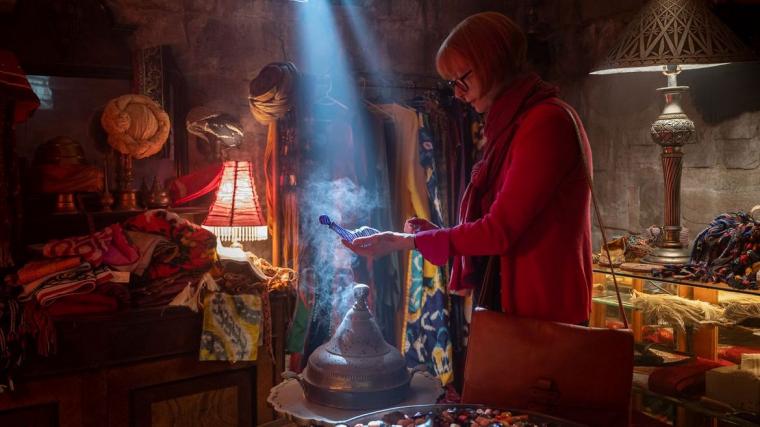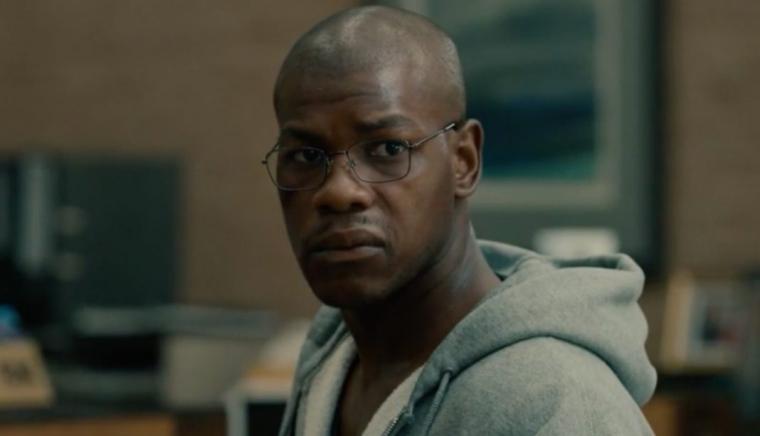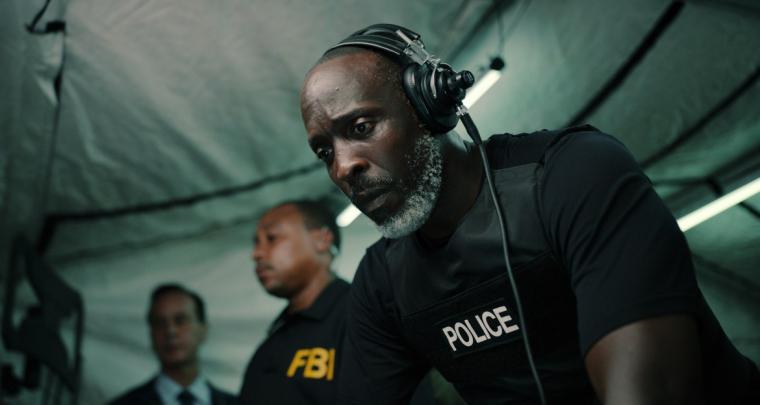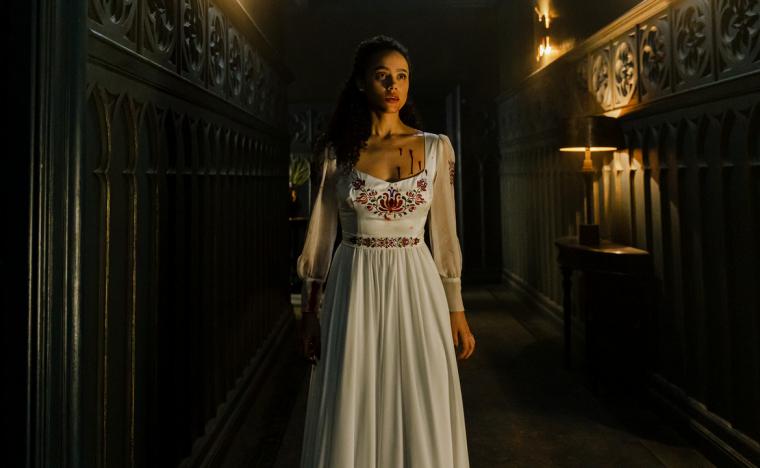
Idris Elba in Three Thousand Years of Longing
THREE THOUSAND YEARS OF LONGING
No one wants to get mugged, but I was delighted to have Three Thousand Years of Longing sneak up on me and knock me out. At first, I thought writer/director George Miller's genre-hopping fantasy seemed a little tacky, and then a little constrictive, and then a little logy. Yet like an epic novel that needs a few hundred pages to really find its rhythm, this riff on the folk tales and fables of One Thousand & One Nights had me utterly transfixed by its midway point, and so moved by its finale that I needed a few minutes to regain my composure. Inventive and weird, incisive and romantic, and the rare film in which you truly can't predict where events will lead, Miller's first feature since 2015 is a loving testament to the power of storytelling. Fittingly, it's a superb piece of storytelling itself.
If you're a Miller fan, you probably don't need to be reminded that his last release those seven long years ago was Mad Max: Fury Road, which scored sensational box office (especially for an R-rated third sequel whose immediate predecessor landed three decades prior), nabbed six Academy Awards, and is quite possibly the greatest action film ever made. If you're Miller, what on earth do you do for an encore? Apparently, you devise an entertainment that's largely about Idris Elba and Tilda Swinton chatting and snacking in hotel bathrobes. Given that Miller's résumé also boasts The Witches of Eastwick, the Susan Sarandon medical drama Lorenzo's Oil, Babe: Pig in the City, and the Happy Feet flicks – the original being the only movie he's won an Oscar for (!) – I suppose that makes sense.
Although Three Thousand Years of Longing involves a number of wildly complicated narrative turns, its basic premise is as simple as a fairytale. In Miller's and co-screenwriter Augusta Gore's adaptation of an A.S. Byatt short story, Swinton plays British scholar Alithea Binnie, a self-described narratologist dedicated to the study of humans' need for, well, stories. We know Alithea's personal saga is a complex one from the moment she arrives in Istanbul for a conference, considering the eerie, vaguely supernatural creatures (unseen by others) who accost her at the airport and the lecture hall. But she insists that her solitary life of the mind is a fulfilling one. She continues to say so even after visiting a marketplace, purchasing an antique glass bottle, giving it a good scrub, and unleashing a genie – or rather, a djinn – who promises to grant Alithea three wishes in exchange for his release. Per the title, Elba's djinn has been waiting a lo-o-o-ong time for this opportunity. He couldn't have imagined that the person who released him would be uninterested in his offer.
That's a terrific, very funny setup, yet interestingly, it's barely played for comedy. (Even when the djinn first appears in Alithea's hotel room and is so large that his foot gets stuck in the bathroom doorway, the moment isn't about laughs so much as awe.) It wouldn't be correct to classify the mood as dramatic, either; Alithea isn't unduly ruffled by this mystical creature's arrival, and while the djinn is perplexed by the woman's wish-receiving obstinacy, he's hardly angry about it. If anything, the film's tone is wistful, even a tad mournful, as the djinn tries to make his case for freedom by detailing centuries' worth of thwarted attempts: at the hands of King Solomon and Queen Sheba; during the Ottoman reigns of Murad IV and Ibrahim the Mad; under the spell of the young wife of an elderly Turkish merchant.

That “Longing” in the title is the perfect word for what Miller gives us. As the djinn recounts his experiences that continually end in abandonment and isolation, he's forced to admit his own culpability – primarily his need to follow his heart over his brain – in his 3,000-year-old mess. And Alithea, mesmerized by his reminiscences, begins to feel an ache, too, longing for the adventures and loves and stories of the type this djinn shares. But she's still not sure about accepting his trade. By nature and profession, she knows how these “three wishes” things end. They're always cautionary tales.
During its opening half-hour, I worried that Three Thousand Years might turn into a cautionary tale of its own: “Be very careful about how you follow Fury Road.” The visual effects, particularly the intangible heat waves (or something) that wafted off of Alithea's ghostly visitors, felt cheesy and oddly unfinished, and once the movie's principal conceit was established, I couldn't fathom how it would sustain our interest. Was this really going to be nearly two hours of the djinn initiating flashbacks and the professor listening to and commenting on them? What I hadn't anticipated, though, was just how engrossing the film's interweaving narratives would be. We know, of course, that all of the djinn's recollections will end with him becoming re-trapped in a small vessel. We don't, however, know the means by which that'll keep happening, and while supplying lush, extravagantly gaudy period design by the truckload, Miller spins his yarns with fabulous thrust and momentum. As with the most gripping stories, the thrill lies in the journey, not necessarily the destination. (With the flashback actors given minimal dialogue, the djinn basically narrates all of his tales, and no film has ever taken fuller advantage of Elba's spectacular, mellifluous baritone.)
Yet the other narrative – the one that could be titled The Scholar & the Djinn – winds up even more fascinating and profoundly affecting. Even very late in the game, I still had no earthly idea whether Alithea would accept the wishes and grant her genie his freedom, and naturally, you won't be getting the answer here. But Swinton's intensely thoughtful, delicately rendered intellectual voyage from “no way” to “well, maybe” is a sight to behold, and in the film's climactic 20 minutes, Miller's ingenious fantasy essentially turns into devastatingly emotional, flesh-and-blood reality – amusingly enough, not unlike the animated penguins entering the real world toward the finale to Happy Feet. What wonderful, lovely, bewitching joy this movie is. I may not have known how Three Thousand Years of Longing would end, but as its closing credits threatened to land, I definitely knew that I didn't want it to end.

BREAKING
Just because a story is true doesn't mean that, as a film experience, it'll play true. Case in point: writer/director Abi Damaris Corbin's Breaking, which tells of how, in 2017, retired Marine Corps veteran Brian Brown-Easley entered a bank in the Atlanta suburbs, slipped a teller a note saying he had a bomb, and told police he'd blow up the bank, his two hostages, and himself if Veterans Affairs didn't give him the money he claimed to be owed. As an end-credits photo of Brown-Easley, in happier times, indicates, this pathetic, heartbreaking tale is genuine, and several of Corbin's cast members give dynamic, richly lived-in portrayals that feel at all times credible. It's just the actual narrative – and John Boyega's strenuous central performance – that I didn't buy.
Regarding the script by Corbin and Kwame Kwei-Armah (based on a 2018 Task & Purpose article by Aaron Gell), it's conceivable that I might have bought it had there been fewer missing pieces. About a half-hour into the movie, it's implied that Brown-Easley is suffering from PTSD, and a call to his ex-wife finds her asking if he stopped taking his medication. But that's where our understanding of his behavior ends. It's never clear whether Brown-Easley's plan is the result of metal imbalance or merely “I'm mad as hell and I'm not gonna take it anymore!” rage at the VA monolith; while it's probable that the filmmakers themselves don't know, they should at least provide clues (even fictionalized ones) to let audiences reach their own verdicts.
And real person or not, Brian Brown-Easley is an impossible figure here. He's unfailingly polite and respectful – addressing everyone as “ma'am” or “sir” and apologizing with agonizing frequency – yet will launch into two-minute-long screaming tirades and wrathfully hang up on the cops and negotiators and televised-news staffers legitimately trying to help him. What are we to make of these immediate, oftentimes incendiary character flips? In one moment, Brown-Easley is doing his best impression of the white-hot Denzel Washington of John Q. (another hostage drama), and in the next, he's answering the Wells Fargo phone and helpfully, comically taking a message from an aggrieved bank customer upset about her 401K.

From one scene to the next, Brown-Easley's actions are utterly baffling, we're granted no insight into how to take them, and poor Boyega is left stranded. Individually, the actor plays every beat passionately and correctly, and it's evident that his heart is in the role. Yet there's no through-line to Boyega's portrayal – given the character's conception, there can't be – and so it's less wrenching than simply puzzling when Brown-Easley can't seem to decide what his end game is, and when he waffles on whether he wants to be on camera, and when we learn that the VA money he's purportedly doing this for doesn't quite hit the $900 mark. In the end, Brown-Easley just seems tragically sick, but because even that opinion is left as merely an opinion, the material can't achieve the emotional gut punch it's clearly aiming for.
Still, despite all the weird lingering questions (When did those two dozen other bank employees and customers leave the building? Why are we spending so much time with Connie Britton's TV producer when nothing comes of the subplot? Why is Jeffrey Donovan acting like such a dick?), a few excellent supporting turns might make Breaking worth an eventual watch. Nicole Beharie is sane, empathetic, and magically real as the bank manager who becomes one of Brown-Easley's hostages, while Selenis Leyva is deeply affecting as the more visibly terrified of the pair. Olivia Washington doesn't get enough to do as Brown-Easley's ex, but she fills in her character gaps with bitter resignation and fierce tough love. As the daughter who remains the one light in our protagonist's life, young London Covington has naturalistic vigor and eyes to melt your soul. And the late Michael Kenneth Williams appears in one of his final film roles as Brown-Easley's chief negotiator, and performs with such reserves of tact, respect, simmering anger, and humanism that you grieve again for all the future Michael Kenneth Williams portrayals we're never going to get. Seeing the actor in Breaking, the title basically described the activity of my heart.

THE INVITATION
Directed by Jessica M. Thompson, The Invitation is a whole bunch of different horror movies in one. It's a haunted-house flick, with its decaying English manor boasting the requisite creaking doors, dim lighting, and cobweb-filled cellars, and the expansive site apparently still home to a long-ago tenant who committed suicide. It's a supernatural-monster flick, with unwitting servants and traumatized guests staring at the ceiling seconds before a mysterious being appears to leap out and suck their souls to Hell. It's a self-aware, darkly comic thriller in the vein of Get Out, with our protagonist the only person of color in an otherwise blindingly white landscape of grotesquely rich aristocrats whose courtesy no doubt hides more sinister motives. And finally, it's a Genre I Probably Shouldn't Spoil outing with goblets whose wine looks uncannily like blood, and everyone involved strikingly more animated in the darkness than they ever are in the light. That's a lot of horror movies for one 104-minute package. One of them is fairly decent.
With the bewitchingly beautiful, appreciatively sardonic Nathalie Emmanuel as the New York ceramicist who unwisely travels abroad to meet long-lost relatives, the fairly-decent one ain't the haunted-house flick, replete as it is with visual clichés and resolutely unsurprising “Boo!” scares. For the same reasons, it ain't the supernatural-monster one, either. And it absolutely isn't the Genre I Probably Shouldn't Spoil outing whose reveal irrevocably turns screenwriter Blair Butler's narrative into camp, and whose ultimate resolution is so blatantly foretold in the final quarter that rolling the credits right then and there would've spared us all a lot of agony.
When Thompson's movie works, to the extent that it does at all, is when the film leans into (a.k.a. steals from) its Jordan Peele inspiration, partly because that conceit is so indestructibly juicy, and partly because the smug, pasty Brits played by Thomas Doherty, Sean Pertwee, Stephanie Corneliussen, and Hugh Skinner (the hapless Harry from Fleabag) are so much fun to root against. They and the estimable Emmanuel shouldn't be enough to make you accept this Invitation, but they make the otherwise dismal proceedings bearable, and matters are helped in this Get Out pupil by the casting of the scene-stealing Courtney Taylor in the Lil Rel Howery role. A hoot even when forced to deliver most of her performance via FaceTime, Taylor, as Emmanuel's best pal, greets the woman's arrival in the U.K. with, “Say hi to Idris Elba if you see him!” Given that he's currently headlining both Three Thousand Years of Longing and the vicious-lion thriller Beast, if Taylor actually wanted to see Elba herself, she should've just gone to a U.S. cineplex.








